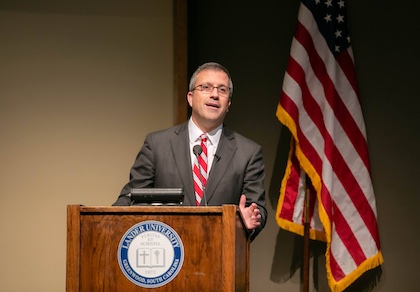District Court Judge McFadden Speaks at Lander for Constitution Day
October 1, 2023Lander University observed Constitution Day on Monday, Sept. 18, with a presentation by Trevor McFadden, U.S. District Court judge for the District of Columbia.
McFadden, whose visit was sponsored by a grant from South Carolina Humanities, was nominated by President Donald J. Trump and confirmed by the U.S. Senate in 2017. He studied under Lander Professor of Political Science Dr. Ashley Woodiwiss when they were at Wheaton College, in Wheaton, Illinois. Woodiwiss, described by McFadden as “a dear friend and mentor,” served as moderator for Monday’s event.
McFadden called the U.S. Constitution “one of the great documents of world history. Aside from Holy Scripture, few documents have had such an important effect on world affairs or been so carefully studied and interpreted.”
The Constitution “acts both as a shield for private citizens from abusive government actions and as a sword to punish government officers who violate its requirements,” he said.
Freedom of speech, freedom of religion and the other rights guaranteed by the Constitution “are not just abstract ideas, but rights that are vigorously enforced in our courts every day,” he said.
The former Soviet Union’s constitution provided many of the same rights. “The rights it described might sound good,” he said, “but they failed to protect Russian citizens from the aggression of their government in practice.”
One of the things that makes the U.S. Constitution different, according to McFadden, is the oath of office.
“Every government officer, from the president of the United States to the police officers who patrol this town, must swear an oath to support and defend the Constitution,” he said.
The Constitution divides the U.S. government into three branches. McFadden said that the tension between the legislative, executive and judicial branches of government “keeps each branch in its place, and preserves our liberties.”
Although McFadden reveres the Constitution, he does not think it’s perfect. It has been amended, he noted, 27 times.
The 27th Amendment, which prohibits Congress from giving itself a pay raise without an intervening election, was first proposed in 1789 by James Madison, but never ratified.
In 1982, after reading about this in a book about the Constitution, Gregory Watson, a sophomore at the University of Texas at Austin, wrote a paper “arguing that this amendment could and should be ratified.” He was so outraged by the “C” his professor gave him that he began writing to legislators around the country.
“Senator William Cohen of Maine liked his idea and pushed his state to pass the amendment in 1983.” Other states followed, and the 27th Amendment was finally ratified in 1992.
The Constitution is a living document, McFadden said. “It was formed in compromise, has been improved over time, and remains a work in progress.”





















